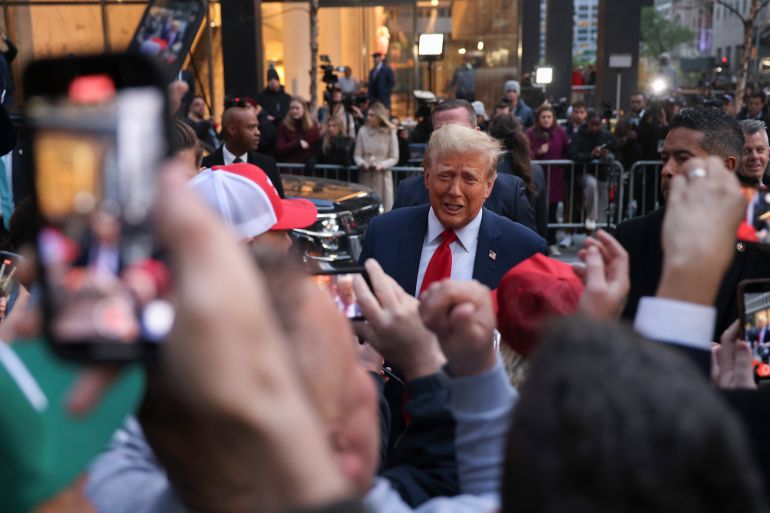Trump faces Supreme Court immunity test as ‘hush money’ trial continues
More witness testimony in New York as top court decides if Trump can be prosecuted in separate federal election case.

Former United States President Donald Trump faces legal tests in New York and Washington on Thursday in two separate cases that hang over his campaign to return to the Oval Office in the November election.
In New York, the third day of witness testimony is to be held in a historic criminal trial, the first against a US president. Tabloid publisher David Pecker is again expected to take the stand as prosecutors seek to paint a picture of a coordinated effort to influence the 2016 presidential election through malfeasance.
Keep reading
list of 3 itemsDonald Trump is doomed. Finally
Man sets himself on fire outside of Trump’s New York hush-money trial
But Trump’s attention may be elsewhere with the US Supreme Court set to consider whether Trump can be prosecuted or claim immunity in a federal case related to his efforts to overturn the 2020 election results.
Trump had requested permission to skip the New York trial for the day to sit in on the Supreme Court session, but the request was denied.
“We have a big case today,” Trump told construction workers in Manhattan during a brief campaign stop before the day’s court proceedings. “The judge isn’t allowing me to go.”
In New York, Trump has been charged with 34 felony counts of falsifying business documents related to payments made to adult film star Stormy Daniels.
The falsification charges concern the alleged mislabelling of repayments that Trump made to his lawyer Michael Cohen, who had paid $130,000 to Daniels in return for her silence over an alleged sexual encounter with Trump. For the felony charges to stick, prosecutors must persuade the jury that the misrepresentations were done with the intent to commit or cover up another crime.
In opening statements on Monday, prosecutors focused primarily on what they described as an illegal effort to “undermine the integrity” of the 2016 presidential election, in which Trump defeated former Secretary of State Hillary Rodham Clinton.
Prosecutor Matthew Colangelo called the payments to Daniels “election fraud, pure and simple”.
On Monday, prosecutors called their first witness, Pecker, former publisher of the National Enquirer tabloid and a longtime friend of Trump’s.
They questioned Pecker on a “catch and kill” agreement reached between Trump and the publisher. Under the agreement, the tabloid would buy potentially politically damaging stories about Trump and prevent them from being published.
Pecker recounted an August 2015 meeting with Cohen and Trump in which he was asked “to help the campaign”.
He agreed to be the “eyes and ears” of the campaign, Pecker testified.
Pecker said he agreed to help Trump’s political ambitions through both the catch and kill scheme as well as through publishing positive stories about Trump and negative stories about his competitors.
He called the agreement “highly, highly confidential”.
The defence has argued that Trump did nothing illegal to justify the felony charges. It has stressed that catch and kill practices and hush money payments are not in and of themselves illegal.
His lawyers have so far portrayed Trump as a businessman and public figure seeking to protect himself and his family from public allegations.
Legal observers say it will be up to prosecutors to fully articulate the exact laws Trump sought to violate with the payments and provide the evidence needed to support that claim.
The stories purchased and stifled by American Media, the owner of the National Enquirer, included claims by model Karen McDougal that she had an affair with Trump. The company has acknowledged it paid McDougal $150,000 to acquire and kill the story. Trump has denied the affair.
American Media also paid a Trump Tower doorman $30,000 for a story claiming Trump had fathered a child out of wedlock.
On Tuesday, prosecutors also called on Judge Juan Merchan to punish Trump for violating a gag order that bans him from talking publicly about potential witnesses in the case.
Trump’s lawyers said Trump was only responding to claims about him in the social media posts in question. Trump himself took to Truth Social during a break in the trial to criticise the judge.
“Everybody is allowed to talk and lie about me, but I am not allowed to defend myself?” Trump wrote.
Merchan has yet to make a decision on whether Trump’s posts were indeed in violation of the gag order.
Supreme Court arguments
The New York case is one of four criminal cases filed against Trump, and it is the only one expected to finish before the presidential election, in which Trump is set to face President Joe Biden in a rematch of their 2020 race.
In Washington, DC, Trump faces federal charges related to allegations he conspired to overturn the 2020 election results in his final days in office.
The Supreme Court will decide whether and to what extent a former president enjoys presidential immunity from criminal prosecution for conduct alleged to involve official acts during his tenure in office.
The determination will have a major impact on how the federal case will proceed, but it is unlikely to have any bearing on the New York case.
In Georgia, Trump faces state charges related to an alleged campaign to pressure elections officials to change the state’s vote count in the 2020 presidential election.
He faces a separate federal criminal case in Florida related to classified documents he allegedly removed from the White House.